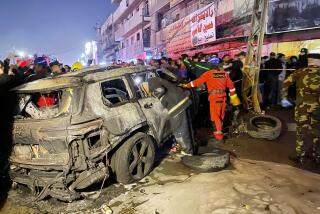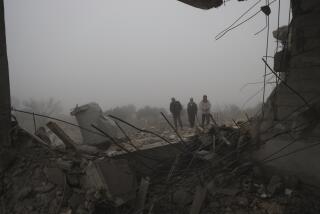Anti-U.S. cleric’s followers turn out in force in Baghdad
Wave after wave of Iraqi men stamped their feet and their hands swung high as they marched in time, dressed in the red, black and white of their nation’s flag. Each group of 100 goose-stepped, carrying a white placard that read “God is great” and gave their unit’s number.
It was the most organized and disciplined display of street power in the eight-year existence of Shiite Muslim cleric Muqtada Sadr’s grass-roots movement, drawing by some estimates 100,000 people into Baghdad’s streets. Their message to their nation’s leaders was: Stick to the plan and get American troops out of Iraq by year’s end.
Sadr’s followers, many of them members of his now-inactive Mahdi Army militia, turned out Thursday from Baghdad and cities across the south. They said proudly that they had fought the U.S. military in the past and were awaiting the call from their leader to fight again.
No other political faction could similarly mobilize tens of thousands in a martial display on the streets of Baghdad.
They shouted “Mahdi!” for the return of the lost descendent of the prophet Muhammad, whom they believe will usher in a just and peaceful era. A drill master jawboned the men, some of them teenagers and others gone gray. “Keep your head up!” he barked. They wore tight shirts and pants like a sports uniform. “I am Iraqi,” read the writing on their shirts.
The legions passed a row of review tents filled with dignitaries from the Sadr movement — lawmakers, community leaders, tribal sheiks and clerics, though it was not clear whether Sadr himself was in attendance. A passing convoy escorted by armored troop carriers and men in black SWAT uniforms was rumored to be carrying the reclusive cleric.
Only three years ago, Sadr’s militia was crushed by troops loyal to Prime Minister Nouri Maliki, which slapped down the movement when the cleric’s followers tried to virtually supplant the government in southern Iraq and Baghdad’s Sadr City district. Members were jailed and Maliki was hailed for confronting the fighters, which were from his own Shiite Muslim majority sect.
Back then, efforts by Sadr to organize million-man marches were often laughable, with some demonstrators confessing they were afraid of arrest and many followers refusing to join in.
Today, in the wake of March 2010 elections, the movement has parlayed 40 parliamentary seats into key posts in Iraq’s ministries and security apparatus, and it once again is wheeling and dealing and at times calling the shots.
Sadr has hinted that he could easily remove his support of Maliki, and he said in February that he might declare protests against the government in six months if basic services didn’t improve. Paramount to him is ending the U.S. military presence in Iraq, which is scheduled to be over by the new year. In a rare sermon two weeks ago, he threatened to reactivate the Mahdi Army as a fighting force if the troops stayed longer.
The Sadr loyalists are fiercely nationalistic and defenders of Iraq’s Shiite underclass. They also committed some of the worst sectarian violence of Iraq’s civil war several years ago. They have fallen into an uneasy alliance with Iran, where Sadr spent much of the last four years before reappearing in January in his home city of Najaf.
Despite the efforts of his opponents to marginalize his movement, Thursday’s rally suggested that Sadr would outlast the U.S. presence in Iraq and play a pivotal role in shaping the country’s future.
“Their show of power in Sadr City today is their way of saying to the U.S., ‘Don’t change your plans — leave!’ and to their political rivals, ‘Watch out, we’re coming — deal with us!’ ” said Iraq expert Joost Hiltermann of the International Crisis Group, a nonprofit organization that studies conflicts.
Veteran Sadr followers who battled U.S. troops said they believed a new era was coming for Iraq. It might not be the one Washington wants, but their rally sent a clear message to all of Iraq and to others who might challenge their wishes.
“We will never be humiliated,” said Sayed Abbas Mussawi, one of the marchers. “If Sayed Muqtada ordered us now, I would fight.”
Salman is a staff writer in The Times’ Baghdad bureau.
More to Read
Start your day right
Sign up for Essential California for news, features and recommendations from the L.A. Times and beyond in your inbox six days a week.
You may occasionally receive promotional content from the Los Angeles Times.






